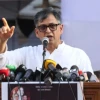Chief Election Commissioner (CEC) AMM Nasir Uddin has said he wants to use the hands-on experience of former Election Commission (EC) officials to identify and close loopholes that could allow election manipulation ahead of the upcoming 13th national polls.
As part of a series of ongoing dialogues aimed at ensuring free, fair, and peaceful elections, the EC on Tuesday began discussions with election experts at its headquarters in Agargaon.
The meeting was attended by the CEC, four election commissioners and senior EC officials.
We want to hear from those who have worked in the field. Many of you know how manipulation and fraud take place because you’ve seen it first-hand. We need your advice on how to block these avenues of malpractice so that such incidents cannot recur,” CEC Nasir Uddin said in his opening remarks.
The session was attended by eight former EC officials and one election observer, who the CEC referred to as “quality participants” from whom the Commission could gain valuable insights. “You have practical experience and know the process better than we do. Tell us where the gaps lie—where manipulation is possible—so we can seal those gaps,” he said.
Among those attending as election experts were former EC officials Md Zakaria, Khandaker Mizanur Rahman, Md Nuruzzaman Talukder, Mihir Sarwar Morshed, Shah Alam, Mir Mohammad Shahjahan, Misbah Uddin Ahmed, Md Shahedunnabi Chowdhury, Mahfuza Akter and Monira Khan, president of the observer organisation FEMA.
The EC began this series of dialogues on 28 September with representatives from civil society and academia, followed by discussions with media representatives on Monday. Later in the day, the Commission is set to hold a similar meeting with women leaders.
According to the invitation letter sent to participants, the EC reaffirmed its commitment to creating equal opportunities for all and ensuring that voters can exercise their rights freely and securely in a festive atmosphere.
It added that election-related laws and regulations were being updated in line with the times and that trained personnel were ready to conduct the polls. However, the Commission emphasised the need for input and cooperation from political parties, academics, civil society, journalists, observers, women leaders, and freedom fighters to ensure a flawless electoral process.
The series of consultations, which began in late September, will continue for the next month and a half, with sessions planned with registered political parties later this month. The EC expects to announce the election schedule in early December, with voting likely to take place in the first half of February before Ramadan.
The CEC said discussions with political parties would take place later, but he was keen to first draw on the field experience of those who had directly managed elections.
You are the real experts who have worked hands-on,” he told the participants. “We are proud to have you here today. We have already implemented many recommendations of the reform commission, and discussions with stakeholders have helped lighten our responsibilities.”
He clarified that the session was not a formal consultation but an opportunity to hear directly from experienced professionals.
Many of the former officials present had served as acting secretaries, joint secretaries, deputy secretaries, and regional election officers, with experience in overseeing multiple election missions.
Acknowledging that the number of participants was small, the CEC said the decision was deliberate: “We’ve already spoken with academics and civil society. Today, we want to hear practical field experience. Some of you know where manipulation occurs and how to prevent it. That’s what we need to learn.”
He said the EC aims to use the valuable feedback to refine its plans: “This will help us identify gaps and improve our overall preparation. Numbers don’t matter—quality does.”
Citing progress in updating the voter list, the CEC said deceased voters had been removed and previously omitted names added, with a noticeable increase in female voters. He added that interest among citizens was rising, and postal ballots were being reintroduced after years of inactivity.
We’ve made the process foolproof and adaptive. A hybrid model has been introduced, supported by IT systems. Postal ballots will be used not only for expatriate Bangladeshis but also for three categories of domestic voters,” he said.
He noted that the Commission had taken several new initiatives and was preparing to tackle emerging challenges such as misinformation on social media.
This is the last opportunity in my life to do something meaningful for the country,” the CEC said emotionally. “I have no personal ambition—only the commitment to deliver a fair, transparent, and widely accepted election. But it’s not possible for the EC alone. We need everyone’s cooperation to move forward together.”

-1759822966.webp)
 Prev Post :
Prev Post :
